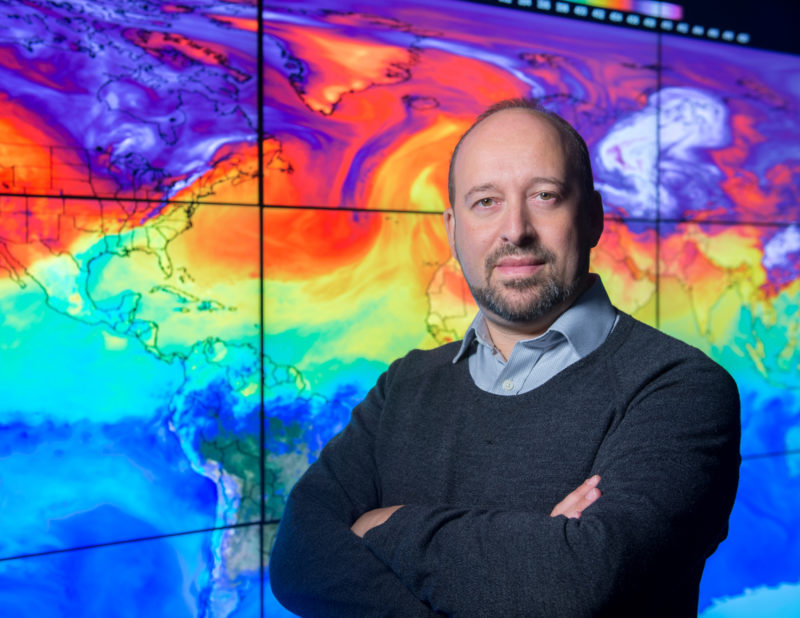NASA Goddard Director Gavin Schmidt to present Piers Sellers PhD prize

Renowned climate scientist Gavin Schmidt, Director of the NASA Goddard Institute for Space Studies, will present the Piers Sellers PhD prize 2018 at a formal event on Monday 18 June.
Two postgraduate researchers will be given the prize, which is awarded by the Priestley International Centre for Climate to current University of Leeds students undertaking excellent research on climate change.
The 2018 recipients are Jesus Vergara Temprado of the School of Earth and Environment and Kate Palmer of the DTC Low Carbon Technology.
It is the first time the prize, given in the name of climate scientist, astronaut and Leeds alumnus Piers Sellers, has been awarded to two winners.
The pair will receive their awards – and £1500 to further their studies – at the forthcoming Piers Sellers PhD prizegiving event at the Clothworkers Centenary Concert Hall at 16.00 on 18 June.
The event will include a talk by Gavin Schmidt, followed by a Q&A. Both prize winners will also give a short presentation on their research.
It will be followed by drinks and canapes and the opportunity to network with climate researchers from across the University.
The Priestley Centre will also be presenting an exhibition of photographs by postgraduate students and early career academics demonstrating the breadth of climate related research and the unique collaborations fostered by the Priestley Centre.
The event is free and open to all staff and students. Pre booking is essential: reserve your tickets here.
Jesus Vergara Temprado
 Jesus Vergara Temprado is affiliated to the Institute for Climate and Atmospheric Science (ICAS) and is studying the modelling of ice nucleating particles in the atmosphere.
Jesus Vergara Temprado is affiliated to the Institute for Climate and Atmospheric Science (ICAS) and is studying the modelling of ice nucleating particles in the atmosphere.
He was nominated for the Piers Sellers PhD prize by his supervisors, Ken Carslaw, Ben Murray and Paul Field, for pioneering research in his PhD resulting in publications that significantly improve our understanding of climate change.
Jesus was lead author of a paper published in Proceedings of the National Academy (March 2018) in which he showed that low concentrations of ice-nucleating particles over the Southern Ocean could explain large errors in the amount of reflected solar radiation calculated by climate models.
These errors are a persistent feature of climate models, and have been demonstrated to affect model climate sensitivity (how much the climate will warm in future), sea ice and the strength of the jet stream.
Jesus’s representation of ice nucleation, developed in collaboration with the Met Office, agrees much better with satellite observations of the amount of ice in the clouds as well as the cloud reflectivity. Critically, the new model also solves the radiation bias problem for these cloud types.
If, as is expected, Jesus’s research could solve some or all of the climate model errors, then his research will have a significant impact on global climate modelling and assessments of climate change.
The discovery was based on another major paper from Jesus’s PhD describing the first ever global model of ice-nucleating particles based solely on laboratory measurements of their physical properties, described as “a major step forward in terms of the physical realism of global climate models” by his supervisors.
Kate Palmer
 Kate Palmer is studying for an interdisciplinary PhD in the DTC Low Carbon Technology at the University of Leeds and is part of the Road Transport research group. She was nominated by her supervisor, Dr James Tate, of the Institute for Transport Studies.
Kate Palmer is studying for an interdisciplinary PhD in the DTC Low Carbon Technology at the University of Leeds and is part of the Road Transport research group. She was nominated by her supervisor, Dr James Tate, of the Institute for Transport Studies.
Kate has led the research, publication (Applied Energy, Jan 2018) and dissemination of the new finding that new battery electric vehicles (BEVs) now offer the lowest total cost of ownership over three years in the UK, Japan and the US.
The story was widely covered by the media internationally, adding further evidence and impetus to encourage more consumers to shift away from combustion engine vehicles to electric vehicles.
Hybrid electric vehicles have a price premium which can often be offset by lower running costs. Total Cost of Ownership combines these purchase and operating expenses to identify the most economical choice of vehicle, a valuable assessment for private and fleet purchasers alike.
The research concluded that in all regions the incremental Total Cost of Ownership of hybrids and electric vehicles compared to conventional vehicles has reduced from the year of introduction to 2015. Hybrid electric vehicle market share was found to be strongly linked to Total Cost of Ownership.
The results of this study were reported in an exclusive by The Guardian and interest in the paper and findings spread quickly across to a number of publications in different countries. The academic paper has also received a great deal of interest, with over 11,000 downloads within two months of publication, making it one of Applied Energy’s most downloaded articles in the last 90 days.
Dr James Tate said: “Kate Palmer’s research has undoubtedly raised the profile of this turning point, where the cost of electric vehicles has fallen below that of standard combustion engine cars for the first time in many developed countries …This has benefits for both local air quality and our climate.”
Featured image: Gavin Schmidt
